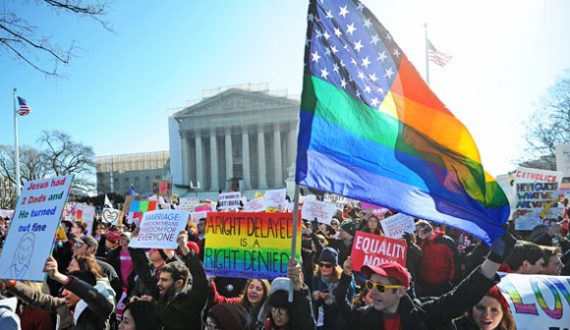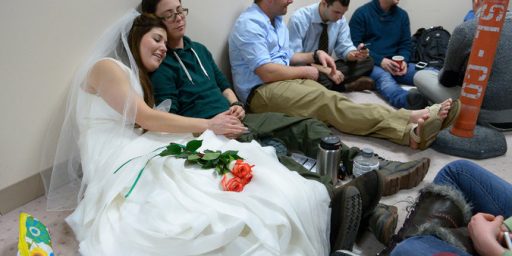10th Circuit Court Of Appeals Strikes Down Utah’s Same-Sex Marriage Ban
A big step forward for the challenge to state-based bans on same-sex marriage.
It was just over six months ago that a Federal District Court Judge struck down Utah’s ban on same-sex marriage ban and refused to issue a stay to the ruling, allowing marriages to take place in the state until the Supreme Court finally granted a stay more than two weeks later. After the stay, the case was appealed to the 10th Circuit Court of Appeals and, today, that Court became the 22nd court to strike down a state’s ban on same-sex marriage and the first Federal appellate court to do so:
DENVER — A federal appeals court ruled Wednesday that states cannot bar same-sex marriages, overturning Utah’s voter-approved ban against them in a decision that extends a long streak of legal victories for such unions.
The ruling by a three-judge panel of the United States Court of Appeals for the Tenth Circuit here in Denver came almost a year after the Supreme Court struck down part of a federal law that denied marriage benefits to same-sex couples.
On Wednesday, the appeals court wrote it was considering an issue in “full bloom.”
“The Fourteenth Amendment protects the fundamental right to marry, establish a family, raise children, and enjoy the full protection of a state’s marital laws,” the court wrote in its 2-to-1 ruling. “A state may not deny the issuance of a marriage license to two persons, or refuse to recognize their marriage, based solely upon the sex of the persons in the marriage union.”
While the judges immediately stayed their ruling, the decision marked one of the largest legal victories yet for advocates of gay marriage, coming on the heels of rulings by lower federal courts across the country striking down other states’ bans on the unions. A federal court in Indiana struck down that state’s same-sex marriage ban on Wednesday.
The appeals court decision upheld a lower-court ruling in December 2013 that overturned a voter-approved prohibition on same-sex marriages in Utah and continued a string of victories for civil rights advocates after the Supreme Court in 2013 struck down a portion of the Defense of Marriage Act, which prohibited federal recognition of legal same-sex marriage. Utah’s attorney general, Sean Reyes, has asked the Supreme Court to review the ruling.
The lower court judge in the Utah ruling, who was appointed by President Obama with support from conservative Utah politicians, said the ban violated the “fundamental right” of same-sex couples to marry. The prohibition, Judge Robert J. Shelby wrote, violated guarantees of due process and equal protection in the Constitution.
His ruling touched off 17 days of legal chaos as hundreds of same-sex couples poured into county clerks’ offices across the state to wed while Utah officials scrambled to stop them and put a halt to the marriages. By the time the Supreme Court intervened and issued a stay in the case — effectively suspending the Utah judge’s ruling and temporarily reinstating the ban — more than 1,000 same-sex couples had married, and many had changed their names, signed up for spousal health insurance and taken steps to become legal parents of children they were raising.
Lyle Denniston analyzes the opinion, which happens to come one day after the one year anniversary of the Supreme Court’s landmark decision in United States v. Windsor:
In the wake of the Supreme Court’s decision last June in United States v. Windsor, striking down a key part of the federal Defense of Marriage Act, there has been a steady stream of rulings by federal trial judges nullifying state bans on such marriage — another such ruling came Wednesday in Indiana (see it here) — but the Tenth Circuit was the first to react to theWindsor decision at the appeals court level.
“A state may not deny the issuance of a marriage license to two persons, or refuse to recognize their marriage, based solely upon the sex of the persons in the marriage union,” Circuit Judge Carlos F. Lucero wrote for the two-judge Tenth Circuit majority. He was joined by Circuit Judge Jerome A. Holmes. Circuit Judge Paul J. Kelly, Jr., dissented, arguing that the Supreme Court had settled the issue against same-sex marriage as long ago as 1972.
While the Supreme Court decision in the Windsor case involved an issue that “is not identical” to the question of state power to ban same-sex marriage, the Tenth Circuit majority said, that decision actually turned on the Supreme Court’s view of the “injury and indignity” that falls on same-sex couples when they are not treated equally.
The similarity of what was at issue in Windsor and the claims of the challengers to the Utah ban “cannot be ignored,” Judge Lucero wrote.
The opinion went on to recognize a right to marry as a fundamental right under the Fourteenth Amendment, and ruled that access to marriage cannot be denied to same-sex couples. That right, the opinion said, focused on “the freedom to choose one’s spouse.”
Beyond an equal right to enter marriage, the ruling said, the Constitution provides the right to “remain married,” thus nullifying Utah’s refusal to recognize same-sex marriages that were performed outside the state for Utah couples.
The Tenth Circuit rejected the common argument made by supporters of bans on same-sex marriage — that is, that same-sex couples were seeking to establish a new right to same-sex marriage, as such. What was at stake, it said, was equal access to marital rights for couples who otherwise satisfy the criteria for a marriage license.
Because it found that the equal right to marry was a “fundamental liberty,” the Tenth Circuit ruled that a ban on same-sex marriage can survive only if it withstands “strict scrutiny” — the most rigorous constitutional test there is. It found that none of the state’s arguments could meet that test.
Noting that some observers have argued that it would be better to leave the marriage question to the democratic process and to the choice of state legislatures, the Tenth Circuit commented that “the judiciary is not empowered to pick and choose the timing of its decisions.
Like all cases before a Circuit Court of Appeals, this case was heard by a three judge panel, and while the majority of the panel supported the decision there was a dissent that rejected the Court’s application of strict scrutiny to the law, instead applying a rational basis test that serves as the lowest level of review under the Equal Protection Clause. Under that standard, the dissent found, there was a rational basis for the Utah law limiting marriage to one man and one woman. It’s worth noting, however, that other Federal Judges have struck down state marriage bans using that same rational basis test and, while I have not read the dissent in full I can say that it didn’t seem to be any more persuasive than the pleadings filed by the people defending these laws. In any case, its the majority opinion that controls here.
In a lot of ways, this decision is similar to the others that have been handed down by various courts at the Federal and State level over the past year. There isn’t anything particularly remarkable about its legal conclusions or the way the Judges in the majority framed their argument that distinguishes it significantly from the other cases. At the same time, though, this case is more significant than any of the other cases that have been handed down since Windsor was ruled upon last year. This is the first Circuit Court of Appeals to rule on the issue, for example, and that alone is likely to have some influence on the cases that remain pending around the country, including those pending before the Sixth Circuit, the Fourth Circuit, and another case pending before the Tenth Circuit dealing with Oklahoma’s ban on same-sex marriage, which is probably the case where this ruling will have its most immediate effect. Effectively, this decision is now the law of the land in an area that includes Oklahoma, Kansas, New Mexico, Colorado, Wyoming, and Utah, plus those portions of the Yellowstone National Park extending into Montana and Idaho. Any District Court cases pending in those states are going to be bound by this decision, which means the outcome is essentially foreordained in each of them. Finally, of course, this Circuit Court of Appeals ruling is essentially the final step before application to the Supreme Court for a Writ of Certiorari. There is provision in the rules for a losing party in a three judge panel case to appeal the matter to the entire Court, which would then hold an en banc hearing. However, those applications are relatively rare and granting such requests is entirely within the discretion of the twelve Judges on the Court. Typically they are denied. Utah officials have said that they would appeal this decision already, and that statement seems to make it clear that they intend to appeal to the Supreme Court, though, so an en banc application is unlikely. Combined with the other cases currently awaiting decision before both the Fourth And Tenth Cases, which could be handed down at any moment, this case makes the likelihood that the Justices of the Supreme Court will be dealing with this issue in their next term extremely likely. Indeed, one year from now, we could be awaiting a decision in one of those cases. Given that this all started some 20 years ago with a decision from a court in Hawaii and that public opinion on this issue has only changed recently, that’s quite a rapid change.
Update: As it turns out, the three judge panel that heard the Utah case also heard the Oklahoma case, so that should mean that we’ll have a similar decision in that case. Although it should be noted that there are some standing issues in the Oklahoma case that could cause the panel to fall short of reaching the merits.
Here’s the opinion:







Is the opinion also binding to other judges on the same circuit, especially the ones doing the Oklahoma case? Does a circuit have to automatically go to en banc if there’s a split between its 3-judge panels?
@Mu:
I addressed that question in an update, but the panel that heard the Oklahoma case is the same one that heard this case.
But for the stay my friends could get married today. Marriage equality comes to Kansas!
Figures. Pretty soon we’ll all have to get gay married.
Maybe Utah will be the state that tells the courts, “Sorry, you have no authority over this matter at the state level, we’re not going to comply with your ruling.” One can only hope…
@medusa: They will challenge but the decision by SCOTUS may well list Utah as defendant. Much like Brown v BOE of Topeka, Utah would forever be linked to marriage equality, as Kansas is to school desegregation. It’s not a bad thing.
@KansasMom
They will challenge but the decision by SCOTUS may well list Utah as defendant.
Actually, the ruling is a furtherance of the abuse of power and over-reach by the federal court system, as exemplified by the overturning of Prop. 8 in California. The Federal courts – and particularly the USSC – has degenerated into assuming the role of a “Super-Legislature” where they usurp the power of the states. This is not good for a representative republic, and is a situation that turns the separation of powers clause(s) in the Constitution completely upside down from their – very clear and stated purpose. State laws in this country were never intended to require the blessing of 9 individuals. And 9 individuals do not have the legitimate power to negate a state constitution provision, particularly provisions that were formally adopted by the people in a manner that makes them part of the State’s constitution.
We have allowed too much for too long and it has perverted the governing system and balance between the federal overseer and the coalition of voluntary states that make up our union.
It is so painfully obvious that homosexuality is a type of birth-defect. It surprises me than so few people realize this. There was an article a few years back on this site concluding that this is the most logical explanation.
When you guys see a butch lesbian in the supermarket, can you or can you not tell that she is lesbian? I can, like close to 100% of the time. Their anatomy is really is different from straight women.
@medusa: You’re nuts, got it. Best wishes snake headed lady.
What if that Federal judge have parents who were legally gay married? How would he have felt living a life of ridicule by others. And not knowing why his real parents abandoned him? Would all gay children continue the upbringing experience and propagate gay marriage? It’s difficult to imagine a society divided like this and a host of psychological problems that will arise. Eventually gay parents will demand the right to take away and raise other people’s children based on privilege and their ability to provide. Procreation levels will drop and custom-designed test tube babies assembly line becomes a reality. It’s the beginning of unnatural laws that leads to destruction.
@medusa: It is not really nine judges deciding. Since these decisions are mostly 5-4 rulings, it is only one man, Justice Kennedy, who decides that homosexual sodomy is equivalent to the conjugal sex act and is entitled to the full sanction and approval of 300 million-plus Americans. It is nothing more than the redefinition of reality itself. It is at heart simply a lie. Read Making Gay Okay by Robert R. Reilly, which is probably the best book on the subject. I do not believe any of the conservative news media has interviewed Reilly or plugged his book. The subject is just too hot to touch, which is a credit to the power of what Bill Maher calls the gay fascists.
@Doug Mataconis: Typical lawyer response, as we can decide on a technicality we don’t have to go to the meat 🙂
Still, I would like to know in the hypothetical case of two similar cases before two different cases of an appeals court, is the second panel bound by the decision of the first?
@James Lee:
If this was parody, it was way too subtle for me.
I am intrigued that you feel that a homosexual lifestyle is so much more alluring than a heterosexual lifestyle, so that straightness would not be competitive…
@HomosexualityIsABirthDefect: So what do you plan to do, kill them?
@grumpy realist: We could all start by telling the truth.